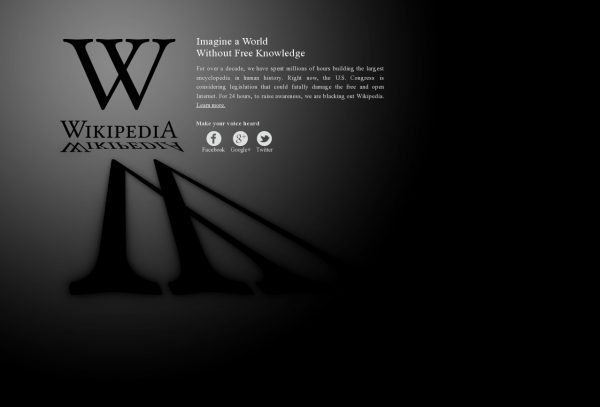SOPA & PIPA – the evil twins?
In the USA thousands of websites are currently involved in a protest against 2 bills known as SOPA and PIPA by blacking out their websites for 24 hours starting at midnight (local time) on 18th January 2012. A screenshot of Wikipedia’s blacked out site is shown below.

Stop Online Piracy Act (SOPA) ( What does violent crime on the high seas – aka piracy – have to do with copyright infringement? I think we should be told. Ed), also known as House Bill 3261 or H.R. 3261, is a bill that was introduced in the United States House of Representatives on 26th October 26, 2011, by House Judiciary Committee Chair Representative Lamar S. Smith, a Republican from Texas, and a bi-partisan group of 12 initial co-sponsors. If made law, would allegedly increase the ability of U.S. law enforcement and copyright holders to fight online trafficking in copyrighted intellectual property and counterfeit goods. The Bill’s proponents claim it protects the intellectual property market and corresponding industry, jobs and revenue and is necessary to bolster enforcement of copyright laws, especially against non-U.S. websites. It would allow the U.S. Department of Justice and copyright holders to seek court orders against websites accused of enabling or facilitating copyright infringement. Depending on who makes the request, the court order could include barring online advertising networks and payment facilitators from doing business with the allegedly infringing website, barring search engines from linking to such sites and requiring ISPs to block access to such sites. Moreover, it would make unauthorised streaming of copyrighted content a crime, with a maximum penalty of five years in prison for ten such infringements within six months. Opponents of the Bill include such internet big guns as Google, Yahoo!, YouTube, Facebook, Twitter, AOL, LinkedIn, eBay, the Mozilla Corporation, Roblox, Reddit, the Wikimedia Foundation and human rights organisations such as Reporters Without Borders, the Electronic Frontier Foundation (EFF), the ACLU and Human Rights Watch.
The PROTECT IP Act (Preventing Real Online Threats to Economic Creativity and Theft of Intellectual Property Act of 2011 or PIPA), also known as Senate Bill 968 or S. 968, is a proposed law with the stated goal of giving the U.S. government and copyright holders additional tools to curb access to “rogue websites dedicated to infringing or counterfeit goods”, especially those registered outside the U.S. (PIPA sounds remarkably similar in its scope and aims to SOPA. Have legislators on the other side of the Atlantic ever heard of “duplication of effort”? Ed.)
SOPA and PIPA are both badly drafted legislative bills that will be ineffective in achieving their stated goal (i.e. stopping copyright infringement) and will cause serious harm to a free and open internet. They put the burden on website owners to police material contributed by their users and call for the unnecessary blocking of entire sites. Small sites won’t have sufficient resources to defend themselves. Another concern is that big U.S. media companies may seek to cut off funding sources for their foreign competitors, even if copyright isn’t being infringed. Foreign sites will be blacklisted, which means they won’t show up in major search engines. Finally, SOPA and PIPA build a framework for future restrictions and suppression.
As such, both bills sound remarkably similar to the UK’s Digital Economy Act (news passim). This was passed with very little debate in the ‘wash-up’ prior to the 2010 General Election. The Digital Economy Act’s impetus is believed to have stemmed from a holiday spent by the then Culture Secretary Peter Mandelson on the yacht of U.S. media mogul David Geffen. The Digital Economy Act, like SOPA and PIPA, introduced draconian copyright protection/infringement measures in the interests of big media companies.
Another similarity between the US and UK legislatures, besides their tendency for draconian measures, is their total lack of comprehension of modern technology. Those that make the laws just don’t “get” modern technology in general and the internet in particular. A recent comment seen by your correspondent encapsulated this ignorance perfectly, suggesting that legislators should not be allowed to interfere with the internet until they fully understand the workings of DNS.
The internet has been a fact of life for some 2 decades now. That means big content – the major film, music and entertainment companies – have had 20 years to adapt and evolve their business model to take account of a new distribution opportunity presented by the internet. Have they done so? Not really. The dinosaurs became extinct due to their inability to adapt to a changed environment. However, unlike today’s dinosaurs, there were no friendly legislators for Tyrannosaurus Rex and his mates to lobby to seek protection from oblivion.

SOPA act: USA #1 on the web NO more!
Web is complex, piracy stop Nerver worked.
Old media stinks and is gone anyway
Only stupids politicians go along.
Triggering a western spring/summer!
Update 20/01/12: According to a tweet today from Mozilla, PIPA & SOPA have now both been indefinitely suspended.